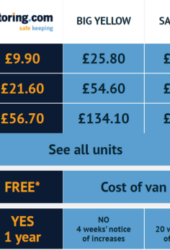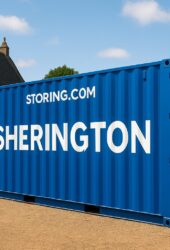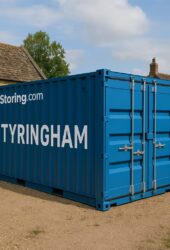Find out more about how small businesses can cut back on the costs of storage, with helpful tips to help you find a new, cheaper storage option to suit your business’s budget.
For small businesses, optimising costs is crucial for sustainable growth and long-term success. With limited resources and budget constraints, finding ways to save money becomes a top priority.
One area where businesses can significantly reduce expenses is storage. Efficiently managing storage needs not only helps free up valuable space but also minimises the financial burden associated with traditional storage options. By saving costs on storage, small businesses can allocate resources to other areas such as marketing, innovation, or expanding their product lines.
Furthermore, the changing business landscape, especially with the rise of e-commerce and online marketplaces, has increased the demand for affordable storage solutions.
Small businesses often face challenges in finding storage options that are not only cost-effective but also flexible and secure. As a result, businesses are increasingly exploring alternative storage methods, such as self storage, to meet their storage needs while keeping costs under control.
In this article, we will explore practical strategies and tips to help small businesses reduce storage costs without compromising on quality or accessibility:
Common Mistakes Small Businesses Make in Regards to Storage
Effective storage management is crucial for small businesses to maintain operational efficiency and financial stability. However, many businesses often make common mistakes that result in unnecessary costs and inefficiencies. By being aware of these pitfalls, businesses can avoid making these mistakes and optimise their storage practices. Here are some prime examples of the kinds of mistakes small businesses can make in regards to their storage:
Reliance on Unsuitable Space:
One of the most common mistakes small businesses make is relying on unsuitable spaces, such as garages or sheds, for storage purposes. While it may seem cost-effective in the short term, these spaces lack proper climate control, security measures, and organisation. Storing valuable inventory or equipment in such spaces can lead to damage, theft, or loss. Instead, businesses should consider utilising professional storage facilities that offer secure, climate-controlled units tailored to their specific needs.
Failure to Assess Storage Needs:
Another mistake is the failure to accurately assess storage needs. Businesses may either overestimate or underestimate the required storage capacity, resulting in inefficient use of resources. Overestimating storage needs leads to unnecessary expenses, while underestimating can cause overcrowded spaces and difficulties in organising inventory. Conducting a thorough assessment of current and future storage requirements is essential for optimising storage space and avoiding unnecessary costs.
Long-Term Contracts with Expensive Storage Providers:
Many small businesses fall into the trap of signing long-term contracts with expensive storage providers. While long-term contracts may offer certain benefits, they can also lock businesses into rigid agreements and high rental rates. It’s important to shop around and compare different storage providers, seeking flexible options with competitive pricing. Embracing alternatives such as self storage facilities can provide more cost-effective solutions without compromising on security or convenience.
Lack of Organisation and Inventory Management:
Disorganisation and poor inventory management contribute to inefficiencies and increased storage costs. When inventory is not properly organised, finding and accessing items becomes time-consuming, leading to productivity losses. Implementing inventory management systems, utilizing labeling and categorisation, and conducting regular inventory audits are essential for streamlining storage processes and reducing costs associated with misplaced or lost items.
Failure to Optimize Space Utilisation:
Small businesses often fail to optimise the utilisation of their storage space. Inefficient layouts, improper shelving, and neglecting vertical storage space can result in wasted areas and the need for additional storage units. Implementing smart storage solutions, such as utilising vertical storage racks, optimising shelf heights, and implementing space-saving techniques, can maximise the use of available space and reduce the need for expansion.
Neglecting Security Measures:
Neglecting security measures is a critical mistake that puts businesses at risk of theft and loss. Small businesses may overlook the importance of security features such as video surveillance, access control systems, and alarm systems. Investing in proper security measures not only protects valuable inventory but also provides peace of mind. When selecting a storage provider, ensure that they have robust security measures in place to safeguard your business assets.
Lack of Flexibility:
Many businesses fail to consider the importance of flexibility in storage solutions. Circumstances may change, and businesses need to adapt. Signing lengthy contracts or committing to rigid storage arrangements limits the flexibility to scale up or down as needed. Opting for flexible storage options, such as short-term leases or self storage facilities, allows businesses to adjust their storage needs based on fluctuations in inventory levels or business growth, ultimately reducing unnecessary costs.
Failure to Evaluate Alternative Storage Options:
Lastly, businesses often overlook alternative storage options that can offer cost savings and convenience. Exploring self storage facilities, shared storage spaces, or on-demand storage solutions can provide more flexible and affordable storage options compared to traditional warehouse or commercial storage spaces.
Saving Money on Business Storage: Strategies and Cost-Saving Ideas
Effective storage management plays a vital role in the financial health of small businesses. With limited resources and budget constraints, finding ways to save money on storage costs can significantly impact a business’s bottom line. By implementing smart storage strategies and exploring cost-saving alternatives, businesses can optimise their storage expenses without compromising operational efficiency. Luckily there are various practical ways small businesses can save money on storage, including ideas like the following:
Assess Your Storage Needs:
Start by evaluating your current storage requirements. Determine which items are essential for daily operations and identify any excess or underutilised inventory. This assessment will provide insights into the actual space needed and help you make informed decisions about cost-saving measures.
Optimise Space Utilisation:
Maximise the use of available storage space in your existing premises. Implement efficient shelving systems, racks, and storage containers to utilise vertical space effectively. By organising and consolidating inventory, you can minimise the need for additional storage space.
Negotiate with Current Storage Providers:
If you’re currently renting storage space, consider renegotiating your contract with the storage provider. Review the terms and conditions, including rental rates, and explore the possibility of negotiating a better deal. Storage providers may be willing to offer discounts or special rates, particularly if you have a long-standing relationship or if there is excess capacity available.
Relocate to a Less Expensive Area:
If your business operates in a city or high-cost area, consider relocating your storage facilities to a less expensive location. Moving to an area with lower property or rental prices can significantly reduce storage costs. While this may require additional logistics planning, the cost savings in the long run can outweigh the initial relocation expenses.
Explore Self Storage Facilities:
Self storage facilities can provide a cost-effective alternative to traditional storage options like warehouses or commercial storage units. Self storage facilities typically offer flexible lease terms and competitive pricing. By switching from an expensive warehouse or commercial storage space to a self storage unit, businesses can save a substantial amount on monthly rental costs.
Rightsize Your Storage Space:
Review the size of your current storage unit or facility. If you find that you are paying for more space than you need, consider downsizing to a smaller unit. Carefully assess your inventory and storage requirements to determine the optimal unit size. Downsizing can lead to significant cost savings without sacrificing storage capacity.
Share Storage Space:
Collaborate with other businesses or organisation to share storage space. If you have excess storage capacity, consider subletting a portion of your storage facility to another business in need. This can help offset the costs of renting the entire space and create a mutually beneficial arrangement.
Implement Inventory Management Systems:
Invest in inventory management software and systems to streamline your storage processes. By accurately tracking inventory levels, expiration dates, and order fulfillment, you can optimise inventory turnover and reduce storage costs associated with excess or obsolete stock.
Implement Just-in-Time (JIT) Inventory Management:
Consider adopting a just-in-time (JIT) inventory management approach. With JIT, inventory is ordered and delivered as needed, minimising the need for large storage spaces. By keeping inventory levels lean and efficient, you can reduce storage costs and improve cash flow.
Embrace Digital Storage:
Explore digital storage options to minimise physical storage needs. Digitise documents, records, and files to reduce the reliance on physical storage space. Cloud-based storage solutions can provide secure and cost-effective alternatives for storing important business data.
Consolidate Suppliers and Vendors:
Work with suppliers and vendors to consolidate orders and deliveries. By reducing the number of deliveries and optimizing delivery schedules, you can minimise the need for additional storage space to accommodate excess inventory.
Being Careful When Choosing Business Storage: Ensuring Perfect Adaptation to Your Financial and Physical Needs
Selecting the right business storage is crucial for small businesses, to ensure their financial and physical needs are met effectively. Careful consideration must be given to various factors to ensure that the chosen storage solution perfectly aligns with the requirements of the business. By taking a cautious approach and following key considerations, businesses can avoid costly mistakes and find storage facilities that cater to their specific needs. When choosing your business storage take care to:
Assess Your Storage Requirements:
Before committing to any storage facility, conduct a thorough assessment of your storage needs. Consider the types of items you need to store, the volume of inventory, and any specific requirements such as climate control or security. Understanding your storage requirements helps you determine the appropriate size and features required in a storage facility.
Consider Location:
Evaluate the proximity of the storage facility to your business location in Essex. Ideally, choose a storage facility that is conveniently located, allowing easy access when you need to retrieve or deliver items. Consider the transportation costs and time involved in accessing the storage unit regularly. Additionally, if your business operates online or relies on deliveries, a strategic location near major roads or transport links can be beneficial.
Security Measures:
Ensure that the storage facility you choose prioritises security measures. The safety of your stored items should be a top concern. Look for facilities that have features such as 24/7 video surveillance, access control systems, well-lit premises, and secure locks for individual storage units. Adequate security measures will provide peace of mind and protect your valuable inventory or equipment.
Flexible Lease Terms:
Flexibility is essential when it comes to business storage. Consider storage facilities that offer flexible lease terms, allowing you to adjust the storage space as per your changing requirements. Flexible lease terms enable you to scale up or down as needed, accommodating fluctuations in inventory levels or business growth. Avoid long-term contracts that may limit your flexibility and tie you down to unnecessary expenses.
Climate Control:
If your business deals with sensitive items that are susceptible to temperature or humidity changes, such as electronics, documents, or perishable goods, consider storage facilities with climate control options. Climate-controlled units maintain stable temperature and humidity levels, safeguarding your items from damage caused by extreme conditions.
Access and Convenience:
Evaluate the accessibility and convenience of the storage facility. Consider factors such as operating hours, access policies, and on-site amenities. Look for facilities that offer extended access hours or 24/7 access if you require frequent access to your stored items. Additionally, on-site features like loading docks, trolleys, or elevators can simplify the process of moving items in and out of the storage unit.
Reputation and Customer Reviews:
Research the reputation of the storage facility before making a decision. Read customer reviews and testimonials to gain insights into the experiences of other businesses. Look for positive feedback regarding cleanliness, customer service, and overall satisfaction. A reputable storage facility with a track record of excellent service and customer satisfaction is more likely to meet your needs effectively.
Cost and Value:
While cost is an important factor, it should not be the sole determining factor when choosing business storage. Instead of solely focusing on finding the cheapest option, consider the value provided by the storage facility. Assess the overall package, including security features, convenience, amenities, and quality of service. Opt for storage solutions that offer good value for the price, ensuring that your financial investment is justified by the features and benefits provided.
Why Not Enquire About Better Storage Services Today To Cut Costs And Maximise Opportunities For Your Small Business
In conclusion, for small businesses, careful consideration of storage options is paramount for maintaining financial stability and fostering growth, especially during challenging economic times. By thinking strategically and securing storage facilities that perfectly suit their needs at the best possible price, businesses can optimise their operations and reduce unnecessary costs. Efficient storage management not only protects valuable inventory but also ensures smooth operations, timely order fulfillment, and improved customer satisfaction.
Moreover, by minimising storage expenses, businesses can redirect those savings towards other critical areas such as marketing, product development, or hiring skilled employees. This financial flexibility enhances the business’s ability to adapt to market fluctuations and seize new opportunities.
By choosing the right storage solution, small businesses in London can navigate economic challenges with resilience and position themselves for growth. It is essential to evaluate storage requirements, prioritise security measures, consider location and accessibility, and explore cost-effective options such as self storage facilities. By doing so, businesses can create a solid foundation for their storage needs, enabling them to thrive and grow from strength to strength even in the face of uncertain economic conditions.





